Related Research Articles

A truck or lorry is a motor vehicle designed to transport cargo, carry specialized payloads, or perform other utilitarian work. Trucks vary greatly in size, power, and configuration, but the vast majority feature body-on-frame construction, with a cabin that is independent of the payload portion of the vehicle. Smaller varieties may be mechanically similar to some automobiles. Commercial trucks can be very large and powerful and may be configured to be mounted with specialized equipment, such as in the case of refuse trucks, fire trucks, concrete mixers, and suction excavators. In American English, a commercial vehicle without a trailer or other articulation is formally a "straight truck" while one designed specifically to pull a trailer is not a truck but a "tractor".
Cargo consists of bulk goods conveyed by water, air, or land. In economics, freight is cargo that is transported at a freight rate for commercial gain. Cargo was originally a shipload but now covers all types of freight, including transport by rail, van, truck, or intermodal container. The term cargo is also used in case of goods in the cold-chain, because the perishable inventory is always in transit towards a final end-use, even when it is held in cold storage or other similar climate-controlled facility. The term freight is commonly used to describe the movements of flows of goods being transported by any mode of transportation.

A truck driver is a person who earns a living as the driver of a truck, which is commonly defined as a large goods vehicle (LGV) or heavy goods vehicle (HGV).
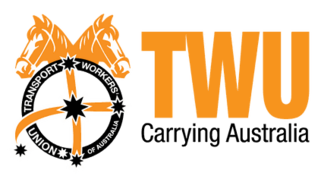
The Transport Workers' Union of Australia (TWU) is a trade union with over 90,000 members throughout Australia. It has 5 main branches in Australia
Less-than-truckload shipping or less than load (LTL) is the transportation of an amount of freight sized between individual parcels and full truckloads. Parcel carriers handle small packages and freight that can be broken down into units less than approximately 150 pounds (68 kg). Full truckload carriers move entire semi-trailers. Semi-trailers are typically between 26 and 53 feet and require a substantial amount of freight to make such transportation economical. The term LTL can refer to the freight itself, or to the carrier that transports the such freight.
A private carrier is a company that transports only its own goods. The carrier's primary business is not transportation.
The Motor Carrier Regulatory Reform and Modernization Act, more commonly known as the Motor Carrier Act of 1980 (MCA) is a United States federal law which deregulated the trucking industry.
New England Motor Freight, Inc. (NEMF) was a unionized less-than-truckload (LTL) and truckload freight carrier, based in Elizabeth, New Jersey. It was one of the largest LTL carriers in the US Northeast when it entered Chapter 11 bankruptcy in 2019 and subsequently shut down all operations in 2020.

Hours of Service (HOS) regulations are issued by the Federal Motor Carrier Safety Administration (FMCSA) and govern the working hours of anyone operating a commercial motor vehicle (CMV) in the United States. These regulations apply to truck drivers, commercial and intercity bus drivers, and school bus drivers who operate CMVs. These rules limit the number of daily and weekly hours spent driving and working, and regulate the minimum amount of time drivers must spend resting between driving shifts. For intrastate commerce, the respective state's regulations apply.
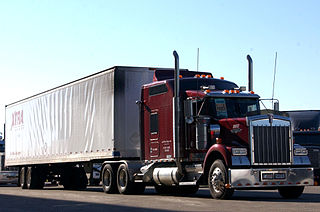
The trucking industry serves the American economy by transporting large quantities of raw materials, works in process, and finished goods over land—typically from manufacturing plants to retail distribution centers. Trucks are also used in the construction industry, two of which require dump trucks and portable concrete mixers to move the large amounts of rocks, dirt, concrete, and other building materials used in construction. Trucks in America are responsible for the majority of freight movement over land and are tools in the manufacturing, transportation, and warehousing industries.
A specialized set of jargon describe the tools, equipment, and employment sectors used in the trucking industry in the United States. Some terms may be used within other English-speaking countries, or within the freight industry in general. For example, shore power is a term borrowed from shipping terminology, in which electrical power is transferred from shore to ship, instead of the ship relying upon idling its engines. Drawing power from land lines is more efficient than engine idling and eliminates localized air pollution. Another borrowed term is "landing gear", which refers to the legs which support the front end of a semi-trailer when it is not connected to a semi-truck. Some nicknames are obvious wordplay, such as "portable parking lot", in reference to a truck that carries automobiles.
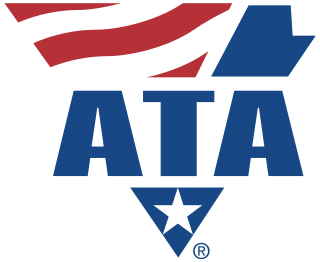
The American Trucking Associations (ATA), founded in 1933, is the largest national trade association for the trucking industry. ATA represents more than 37,000 members covering every type of motor carrier in the United States through a federation of other trucking groups, industry-related conferences, and its 50 affiliated state trucking associations. Former Governor of Kansas Bill Graves was replaced by Chris Spear as the ATA's president and CEO in July 2016.
The National Private Truck Council (NPTC) is a national trade association in the United States which represents private motor carrier fleets.
DAT Solutions, LLC, often referred to as DAT Freight & Analytics, and originally known as Dial-a-Truck, is a US-based freight exchange service and provider of transportation information serving North America. Freight exchange services are used to match material ("loads") that needs to be shipped with over-the-road carriers that can be hired to move those loads. DAT was established in 1978 and is part of Roper Technologies. It's co-headquartered in Denver, Colorado and Beaverton, Oregon. Claude Pumilia is President and CEO, responsible for DAT’s strategy and execution.

The trucking industry in the United States has affected the political and economic history of the United States in the 20th century. Before the invention of automobiles, most freight was moved by train or horse-drawn vehicle.
Michael H. Belzer is an internationally recognized expert on the trucking industry, especially the institutional and economic impact of deregulation. He is a professor in the economics department at Wayne State University. He is the author of Sweatshops on Wheels: Winners and Losers in Trucking Deregulation. Along with Gregory M. Saltzman, he coauthored Truck Driver Occupational Safety and Health: 2003 Conference Report and Selective Literature Review, National Institute for Occupational Safety and Health, 2007. He has written many peer-reviewed articles on trucking industry economics, labor, occupational safety and health, infrastructure, and operational issues.
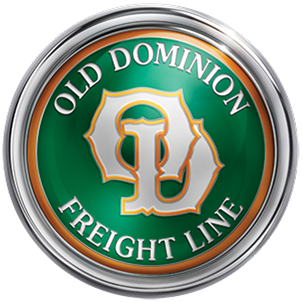
Old Dominion Freight Line, Inc. (ODFL) is an American regional, inter-regional and national less than truckload shipping (LTL) company. In addition to its core LTL services, the company offers logistics and household moving services.
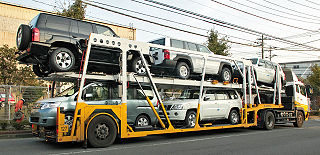
An auto transport broker is a type of cargo broker that specializes in the shipping and transportation of vehicles. Most vehicles shipped in the U.S. are cars and trucks, but many brokers handle boats, RVs, motorcycles and other types of vehicles as well. Auto transport is classified as "specialized freight trucking" under NAICS code 484230.
Daseke, Inc. is the largest owner and a leading consolidator of flatbed and specialized transportation in North America, comprising 16 operating companies with over 5,200 trucks and over 11,000 flatbed and specialized trailers.

WTI Transport, Inc. is a for-hire carrier based in Tuscaloosa, Alabama with terminals in Birmingham, Mobile and Whites Creek, TN. A flatbed company of approximately 370 tractors, WTI hauls freight throughout the Southeast, Midwest, Southwest, and East Coast. WTI’s fleet is a mixture of company drivers and owner-operators. Shipments consist mainly of roofing, building materials, and all types of aluminum, iron and steel products. Currently, WTI is a subsidiary of Daseke
References
- ↑ "OOIDA Timeline, Owner-Operator Independent Drivers Association". Owner Operator Independent Drivers Association, Trucking Association. Retrieved 2019-06-04.
- ↑ Trucking Deregulation, by Thomas Gale Moore: The Concise Encyclopedia of Economics: Library of Economics and Liberty
- ↑ "A Guide To Becoming An Owner Driver - Return Loads". www.returnloads.net. Retrieved 2019-06-04.